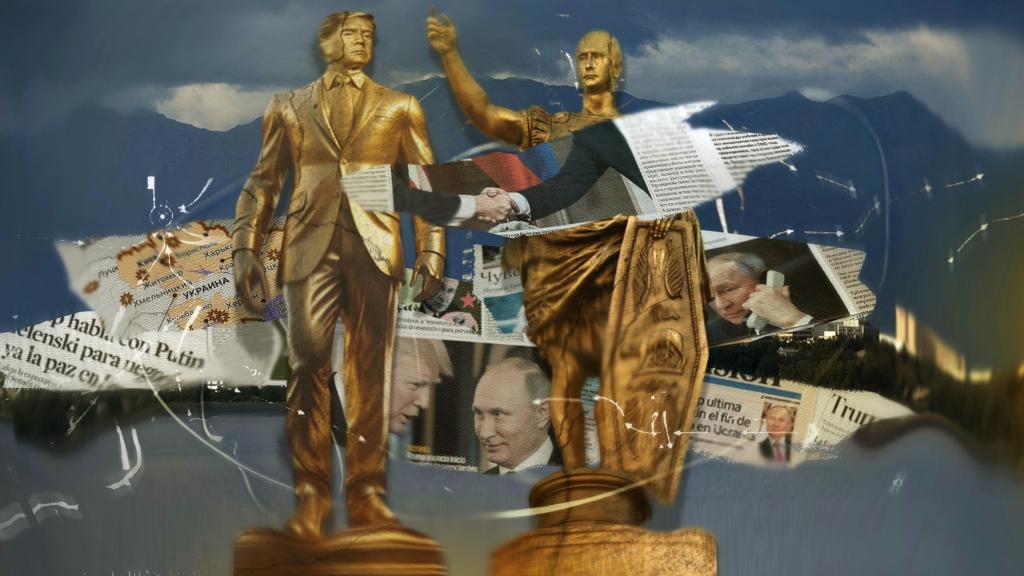Negotiations in Alaska: Does Trump’s peace deal for Putin have a future?

First published at Posle.
On August 15, negotiations between President Trump and President Putin took place in Anchorage, Alaska. The primary topic of discussion was the “Ukraine deal.” Despite reports of successful negotiations by both parties, a definitive agreement has not been reached. This meeting followed Trump’s pre-election promises to end the war swiftly, a series of ultimatums to Putin, and criticism of the Ukrainian leadership by the US president. Strangely, the meeting, which sought to decide the possible future of Ukraine and Europe, took place without the participation of either.
The fact that direct negotiations took place between the US and Russian delegations can be considered a foreign policy success for Putin. It is important to acknowledge that the primary objective of the invasion of Ukraine has never been to protect “Russian speakers.” Instead, one of the primary factors driving this agenda has been the Russian dictator’s pursuit of a sphere of influence that is recognized by world leaders. Putin has expressed his belief that Ukraine lacks sovereignty and is instead under the influence of the “West,” indicating that, in his opinion, meaningful negotiations are only possible with the United States. This is the reason why Trump’s earlier efforts to “bring the leaders of Russia and Ukraine to the negotiating table” have been unsuccessful, with Russia systematically undermining all negotiations by consistently presenting its own unrealistic ultimatums.
Trump’s decision to meet with Putin in person effectively acknowledges Russia’s claims to its own sphere of influence. This shift in perspective effectively transforms the Russian invasion and its consequences from a blatant violation of international law into a matter of routine negotiation. While at the onset of the full-scale war, diplomacy centered on Russia’s obligation to respect international law and recognized borders, now Ukraine and Europe are forced to acknowledge “Russia’s legitimate interests.” The United States president’s role is to compel Ukraine to accept this state of affairs — to accept it without suffering military defeat and even after dealing several painful blows to the aggressor’s vastly superior army. However, they are forced to accept it while navigating the changing political landscape in democratic nations, particularly the growing influence of politicians who are willing to collaborate with authoritarian leaders. In his interview with Fox News after the talks, Trump emphasized that “now everything depends on Volodymyr Zelensky” and that Zelensky “must agree to the ‘deal’.”
The meeting between Trump and Putin in a democratic state is a significant development in global politics. This development indicates a notable shift in Putin’s international standing, elevating him out of political isolation and providing a respite from sanctions. This development also suggests a strategic reappraisal of Russian diplomacy, potentially leading to a broader recognition of the alleged “fairness” of its demands and absolving it of responsibility for unleashing military aggression. This, in turn, only reinforces militarism and dictatorship in Russia. The elites have received a clear signal that business relations will resume in the near future, while the population is becoming increasingly convinced that no change is possible and that the authorities will get away with anything. The ongoing militarization of society and the expansion of the military-industrial complex are bound to continue even after the end of the war, until they ultimately lead to another military conflict.
The future for peace
Trump’s negotiations have captured everyone’s attention, evoking mixed emotions: hope for an end to the war, but also anxiety about its consequences and the terms of the potential deal. Public statements by the negotiators are vague and often contradictory, further heightening the sense of uncertainty.
For residents of both warring countries and concerned people around the world, a ceasefire is the most desirable outcome. However, whether Russia’s position of impossible ultimatums has changed or if all the talks are just another delaying tactic remains a mystery. Today [August 16], Minister Lavrov stated that the goal of the “special military operation” is to “protect” Russian people, not to seize territory. So far, at least, Trump’s meetings and phone calls with Putin have had no effect on how the war is going. Russia continues its slow advance, grinding down its own soldiers and those of other countries in assaults and striking cities daily, causing destruction and dozens of civilian casualties. Meanwhile, Russia’s economy is facing mounting challenges: the impact of budget allocations to the military is fading, and the modest GDP growth is slowing down rapidly.
In this context, Putin’s diplomatic success was that Trump brought him out of political isolation and made some of Russia’s imperialist foreign policy claims seem legitimate. This is already obvious, as is the fact that Trump is putting maximum pressure on Ukraine regarding the claims he has deemed acceptable. For now, however, Putin’s only compelling argument remains military force and the threat of using it.
Peace is necessary not only to stop the killing but also to begin healing the wounds inflicted by war. Forgiving, understanding, acknowledging responsibility, and rebuilding relationships is always difficult. It will be three times as difficult if Ukraine is forced into an unjust peace, and if Putin continues to threaten the world and corrode Russian society with propaganda and militarism.